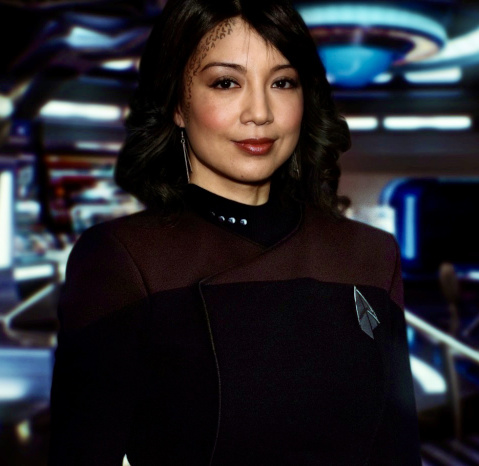The lights flickered as the regional power grid failed. With sunlight pouring through the westerly windows, it didn’t matter for illumination, but it absolutely mattered for the eighty five souls on life support in the ward. Dr. James Henderson breathed a sigh of relief as he heard the whir of turbines as they kicked in. That backup generator would keep his patients from passing beyond the veil.
“Thank god they got that operational yesterday,” he said under his breath as he checked to make sure the power flicker hadn’t disrupted any of the life-sustaining equipment of his patients.
Even though hundreds of thousands of people were displaced, and the mills and factories were mostly silent, Commander Cora Lee had prioritized the hospitals first. It had been a tall order to get them operational as the Jem’Hadar had stripped them of everything that had a modicum of combat applicability. The Dominion had no respect for the sanctity of life. Thankfully, Commander Lee was an engineering wizard. By the time the sun rose after the battle, several facilities were already online to take on critical patients, and more had come online since then. There were so many victims of the brutal occupation and the deadly fight for the soul of the city, and they still did not have new enough capacity for everyone, but it was a start.
As Dr. Henderson walked the beds, he noted a control unit for a ventricular assistive device had become desynced. While he worked to reset it, he addressed the patient it was attached to. “How are you feeling this afternoon, Mr. Gilroy?” he asked the middle aged man with hypokinesis in his left ventricle from a debris strike. The doctor’s demeanor gave no hint to the fact the man had almost died as a result of that power failure. Panic helped no one, and especially not someone on cardiac life support.
“Still a bit lightheaded,” Mr. Gilroy replied with labored words as he struggled to sit up. “But alive, and given the circumstances, that’s plenty to be thankful for.” He placed his hand on the bandages above his chest, flashing back to that moment when the grenade went off, the concrete wall shattering, a piece of the wall striking him in the midsection. He would have been dead if not for Dr. Henderson, Commander Lee, and so many other dedicated officers.
Once Dr. Henderson had the control unit reset, he moved on to continue his rounds. Elsewhere among the beds, four other doctors and nurses were doing the same. They did their best to tend to everyone, but five staff for eighty five patients was not an ideal ratio. Regulation dictated the ration should not exceed one per six in an emergency department setting. This trauma ward was absolutely an emergency department setting but its ratio was one per seventeen.
When Dr. Henderson finished his rounds, he shrunk away to a quiet corner of the ward behind a privacy curtain. There, hidden from his patients and staff, he could drop his guard. He keeled over, hands on his knees, as he shut his eyes and exhaled deeply.
Dr. Henderson was beyond exhausted. He’d slept two hours in the last twenty four, and five in the last forty eight. But he had to keep going. These patients, and so many more like them, they needed him. He pulled a hypospray out of his bag and pressed it against his skin. The hiss brought him the relief he needed. He straightened up. It was time to get back to work.
“You okay doctor?” asked a gentle voice as Dr. Henderson reemerged from behind the privacy curtain. It was Lieutenant Emilia Balan, the cultural affairs advisor from the USS Polaris who was doing double duty conducting psychological wellness checks for the ward’s patients.
“Yes, yes, I’m fine,” Dr. Henderson assured her as he passed her.
Lieutenant Balan didn’t think anything of it. Whether due to her respect for the seasoned doctor or just due to her inexperience with stressful settings, she didn’t recognize the signs. She just turned back to her patient, a young woman in a wheelchair, missing both legs, with blotchy skin from advanced stage sepsis. “I’m sorry about that,” Lieutenant Balan apologized lightly. “You were saying?”
“It was all just so hard,” the woman said, picking up where she’d left off before the interruption. “First they came for my brothers, a teacher and a painter. They said their careers were unproductive, and they sent them to the metalworking plants. Then they came for my father, a retiree, and they sent him to the mines.” Her face grew sad as she struggled with the words. “They said… they said that if they didn’t do as they were told, then they would come…” She stopped for a moment. It was so hard to say. “Then they would come for me.”
Lieutenant Balan placed a gentle hand on her shoulder. “Please, we can stop if it’s too much.” She felt for this woman, someone so young who had suffered so much. This was why the Polaris and her sister ships had put it all on the line. In another time and another place, this woman could have been her. They were about the same age.
The woman started crying. “No! I want to tell you,” she pleaded with teary eyes. “My brothers, my father, they were good people. They tried. They tried so hard. Every day, they’d rise before the sun, and every night, they wouldn’t get home until after dark.” She paused for a moment, again working up the strength to continue the story. “And then, one day, my father didn’t come home. Those monsters showed up with my brothers. They… they told us that my father was dead because my brothers weren’t working hard enough.”
The woman’s crying turned to unconsolable weeping. Her agony echoed through the otherwise quiet ward, overwhelming the low din of the backup generator, ventilators, and cardiopulmonary bypass machines that were busy keeping these patients alive.
Dr. Henderson came up behind Balan. “Lieutenant, I’m sorry, but we need to cut this short. Ms. Amol needs to rest.” His patient’s blood pressure was spiking, and if mean arterial pressure climbed too much, the vasopressors in her system would become problematic.
“No!” the woman pleaded. “Let me finish! Please!” She looked up at them with grief stricken eyes, tears running down her cheeks. She wanted so badly to tell someone her story. “My brothers, they went back to work the next day. But that night, the Jem’Hadar showed up again. And that’s when… when they did this to me…” She gestured to where her legs had once been. “To… to inspire them to work harder.” She spat those words out as overwhelming despair overtook her. “I… I’m sorry, I can’t…” She couldn’t finish the story, the part where she would have told the Lieutenant how, on the night before the Polaris arrived overhead, as she lay there struggling with the early stages of sepsis, only one of her brothers came home.
Alarm bells began going off on the vital monitors as the woman started shaking. Two medical techs came rushing over with equipment, and Balan stepped out of the way so they could work. The Lieutenant opened her mouth to say something, but the woman she’d started spasming and went unconscious before she could find the words.
“Lieutenant, that’s it for today.” Dr. Henderson’s words were firm. This was not the time.
Lieutenant Balan was stricken with guilt. What had she done? Had she inadvertently triggered an acute stress response? Had she just made the woman’s situation worse? That woman had already endured so much. The medical techs were shouting readings and Dr. Henderson was issuing instructions, but she couldn’t hear any of it as she fled from the ward into the sterile hallways of the hospital. She was lightheaded, her stomach twisting, her mind racing. She felt like she was going to pass out. She leaned up against the wall, taking deep breaths, trying to calm down.
“Lieutenant, you okay?”
Balan looked around. At eye level, she saw no one, but then she noticed a Chief Petty Officer lying there on the ground working with some wires and a circuit board.
“No, no, I’m not.” Lieutenant Balan broke into uncontrollable tears.
Chief Ayala Shafir lifted herself off the floor. Her work could wait. She only knew Lieutenant Balan in passing, but Ayala Shafir knew those tears well. They were the tears of someone in great pain, and she knew such pain well. She extended her arms in a hug and pulled Lieutenant Balan close as she cried, and cried, and cried.
“These people, they’ve gone through so much,” Balan managed to say between bouts of tears. “And I just made it worse. Me and my stupid question. I just wanted to hear her story, to be a person for her to talk to, and now she’s in shock, convulsing, vitals spiking, having an acute stress response… because of me.”
“Lieutenant, I’m pretty sure you’re having an acute stress response yourself right now,” Chief Shafir replied as she looked the Lieutenant in the eyes. “But if she was telling you her story, it’s because she wanted to tell you.” The Lieutenant looked at her confused. “It’s a form of therapy to help your mind process events it struggles to understand.”
“No, no, I get that,” nodded the Lieutenant, coming back to her senses a bit. “But Chief, since when does a digital systems specialist know about this stuff?” Lieutenant Balan didn’t know much about Ayala Shafir other than that she was a specialist with the Advanced Science, Technology and Research Activity, and that she’d been part of the covert team that had gone to Nasera ahead of the Polaris.
“Since that hacker chick has accumulated a bit of trauma herself over the years,” Chief Shafir chuckled. She didn’t offer her story though. That was hardly what this woman, on the verge of a breakdown, needed to hear. Not unless she wanted Balan to absolutely crumble.
“But, I caused her to…” Balan began to say.
“No ifs, ands, or buts, Lieutenant,” Chief Shafir interrupted. “Doc Henderson will have her good as new in no time, but she’ll still remember your compassion and that you were there to hear her story.”
Lieutenant Balan nodded. Maybe the Chief was right. “There are so many stories like this. Hundreds… thousands… millions. Eight million people Chief,” Balan said regretfully. “That’s how many people went through this hell.” It was unfathomable what they had endured, the forced labor camps, the gross psychological warfare, the physical torture, the executions. Emilia Balan spent her life seeking out the beauty in every place, but she could find no beauty here. It was just unadulterated pain and suffering.
“And every day, you are here helping them little by little,” Chief Shafir countered. “Listening, talking, sharing, helping them heal.” Shafir knew that pain would never disappear, but over time, they, just like her, would learn to walk again. “It is a beautiful thing you do for them Lieutenant.”
“I guess,” Balan conceded. “But the more I hear their stories, the more I don’t get it.” Her tone became angry as she thought about it all. “How does all this happen while the Federation does nothing? ‘We the lifeforms of the United Federation of Planets determined to save succeeding generations from the scourge of war, and to reaffirm faith in the fundamental rights of sentient beings, in the dignity and worth of all lifeforms’ is how our Charter begins. To save succeeding generations from war. The dignity and worth of all lifeforms. How the fuck do we stand idle as this happens?” Lieutenant Balan did not swear, but she couldn’t hold her tongue. It was just too much. She was furious about it.
“We did not stand idle,” Chief Shafir reminded her, thinking back to the ordeal they had been through, the lives they had lost. “We answered the call to protect the dignity and worth of all those here who suffered at the hands of the Dominion.” And that made it worth it.
“But the rest of the Federation, Chief. Where are they? Why do they not answer?”
“I would say it’s human nature to shrink away when the danger is too great,” Chief Shafir replied. She didn’t have faith in humankind. She’d seen too much to believe in them.
“Forgive me Chief, but I just can’t believe that. The human heart cares for its neighbors and gives of itself to shelter them. Look at the 1,600 souls on the Polaris. We gave so much to free those people. I have to believe we are not unique,” insisted Lieutenant Balan.
“Then they simply do not know,” replied Chief Shafir flatly.
“Come again?”
“If you’re right, and humanity would rise to fight this scourge if they knew of it, then the only logical explanation is that they do not know.”
“How is that possible?”
“Are we anything but slaves to those that provide us information?” asked the Chief. Ayala Shafir had spent more than enough time compromising digital systems to know the power of information. “Our world is shaped by the message we get from our media, our governments, and our superiors.”
Lieutenant Balan nodded.
“I mean think of our own mission Lieutenant,” Chief Shafir continued. “Did you know the plight of Nasera before Admiral Reyes gave us our orders?”
“No.
“And where did she get those orders from?”
“Fourth Fleet Command.”
“And where did they get them from?”
“Starfleet Command?”
“Cute idea, but no,” Chief Shafir disclosed. She knew the truth from Commander Lewis, who had been there with Allison Reyes. “Fourth Fleet Command acted unilaterally based on its own intelligence data and the authority it has from its galaxy-wide mandate.”
Lieutenant Balan quirked her head. “Wait, so what are you saying about Starfleet Command?” It sounded crazy what the Chief was implying.
“I’m saying nothing about Starfleet Command specifically,” replied Chief Shafir. “But up there somewhere, whether in our leadership or in the civilian government and the media, the flow of information has been cut off.” That was quite an accusation, but it was the only logical conclusion if Lieutenant Balan was right about the nature of humankind. “It’s either that or you accept my pessimistic view on humanity.”
It was at that moment that Lieutenant Balan realized what they needed to do.

 Bravo Fleet
Bravo Fleet














